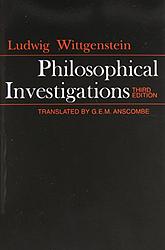Philosophical Investigations by Ludwig Wittgenstein
This book is a seminal work in 20th-century philosophy, presenting a detailed critique of the notion that our language directly corresponds to reality. The author argues that the meaning of words is not inherent, but rather derives from their use within specific forms of life. The book also introduces the concept of language games, suggesting that our understanding of language is akin to learning the rules of a game. The author further explores the limits of language, the nature of understanding, and the relationship between public and private language.
The 495th greatest book of all time
Ranking Details:
Our ranking system awards points to books based on their appearance and position on curated lists. Here's how it works:
Unranked Lists: For lists without specific rankings, each book receives points equivalent to the list's weight. This approach recognizes the book's inclusion on prestigious lists.
Ranked Lists: Books on ranked lists receive points in two ways:
- Base Points: Initially, every book is awarded points equal to the list's weight, acknowledging its significance.
- Bonus Points: Additionally, books earn bonus points based on their ranking. The total bonus pool, equal to 100% of the list's weight, is distributed among the books, with higher-ranked books receiving more points.
Exponential Distribution: The distribution of bonus points follows an exponential model. This means the top-ranked book (#1) receives significantly more bonus points than those further down the list (e.g., #100). Our algorithm ensures that higher placements are rewarded more generously, reflecting the achievement of a top rank on any given list.
This scoring system ensures that each book's ranking reflects both its presence on multiple lists and its positions within those lists, providing a comprehensive measure of its acclaim and popularity.
Total Points: 698
Since this book was first published in 1953, there is a penalty of 0%. The age adjusted score is 698.0.
This is to prevent newer books from reaching super high on the ranked list of the greatest books of all time. The greatest books should also stand the test of time.
- score: 114 -- The Hundred Most Influential Books Since The War (WW2) (Weight: 114)
- score: 114 -- Books of the Century (Weight: 114)
- score: 112 -- The Modern Philosophical Classics (Weight: 96)
- score: 108 -- 25 acclaimed international writers choose 25 of the best books from the last 25 years (Weight: 108)
- score: 90 -- Our Users' Favorite Books of All Time (Weight: 90)
- score: 69 -- The 50 Best Books of the Century (Weight: 69)
- score: 45 -- Great Books of the Western World (Weight: 45)
- score: 45 -- The 100 Most Influential Books Ever Written (Weight: 45)

